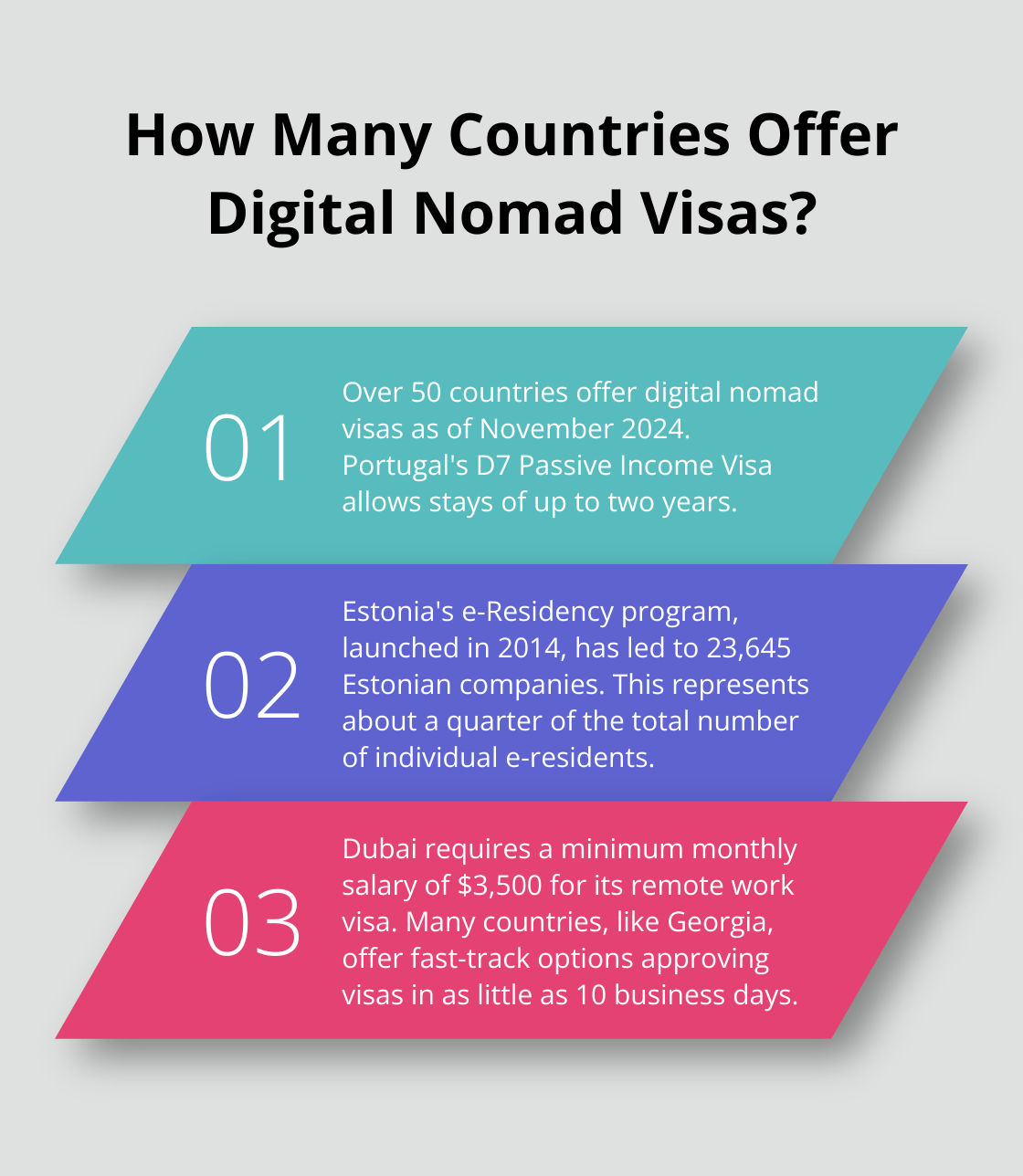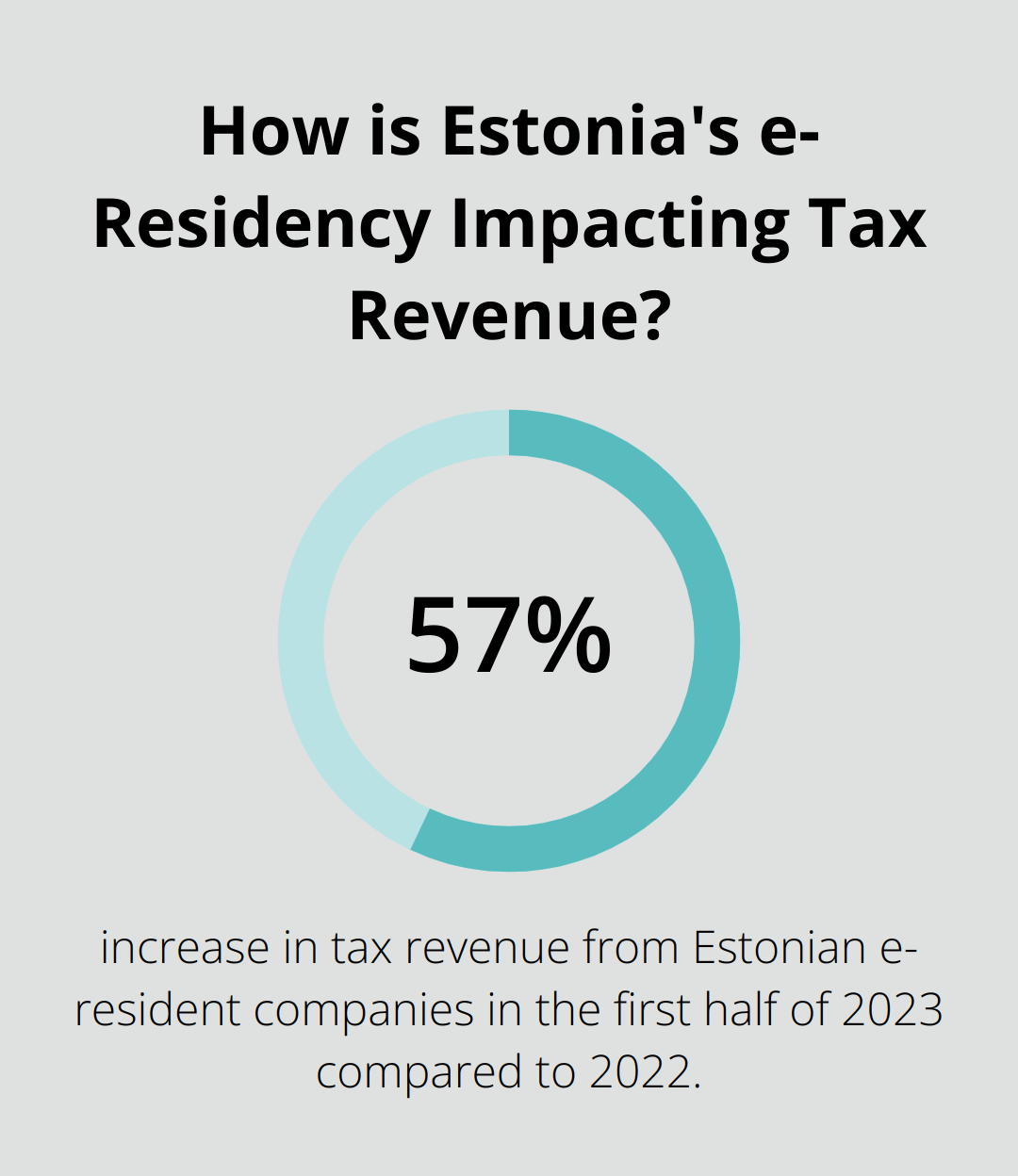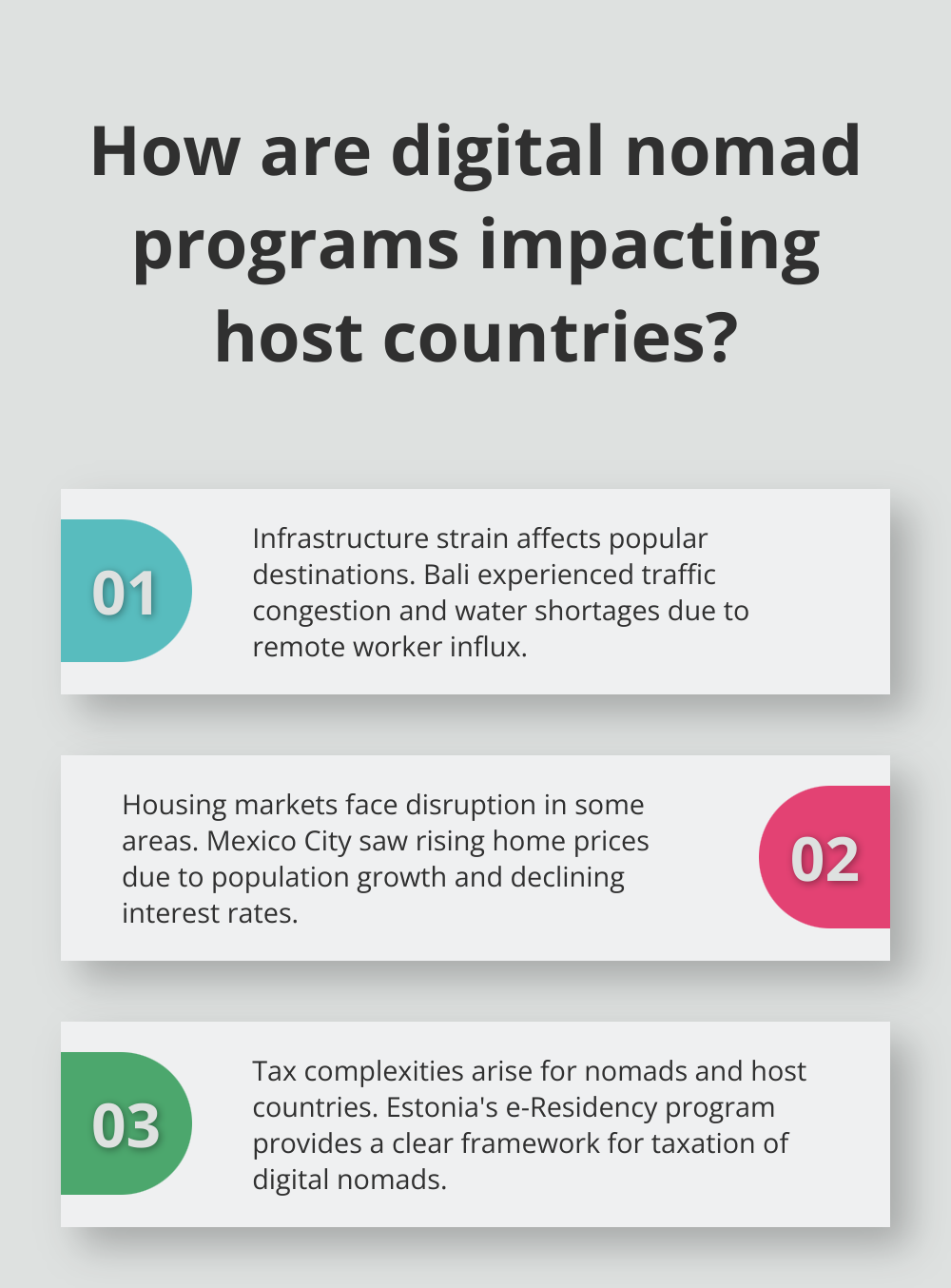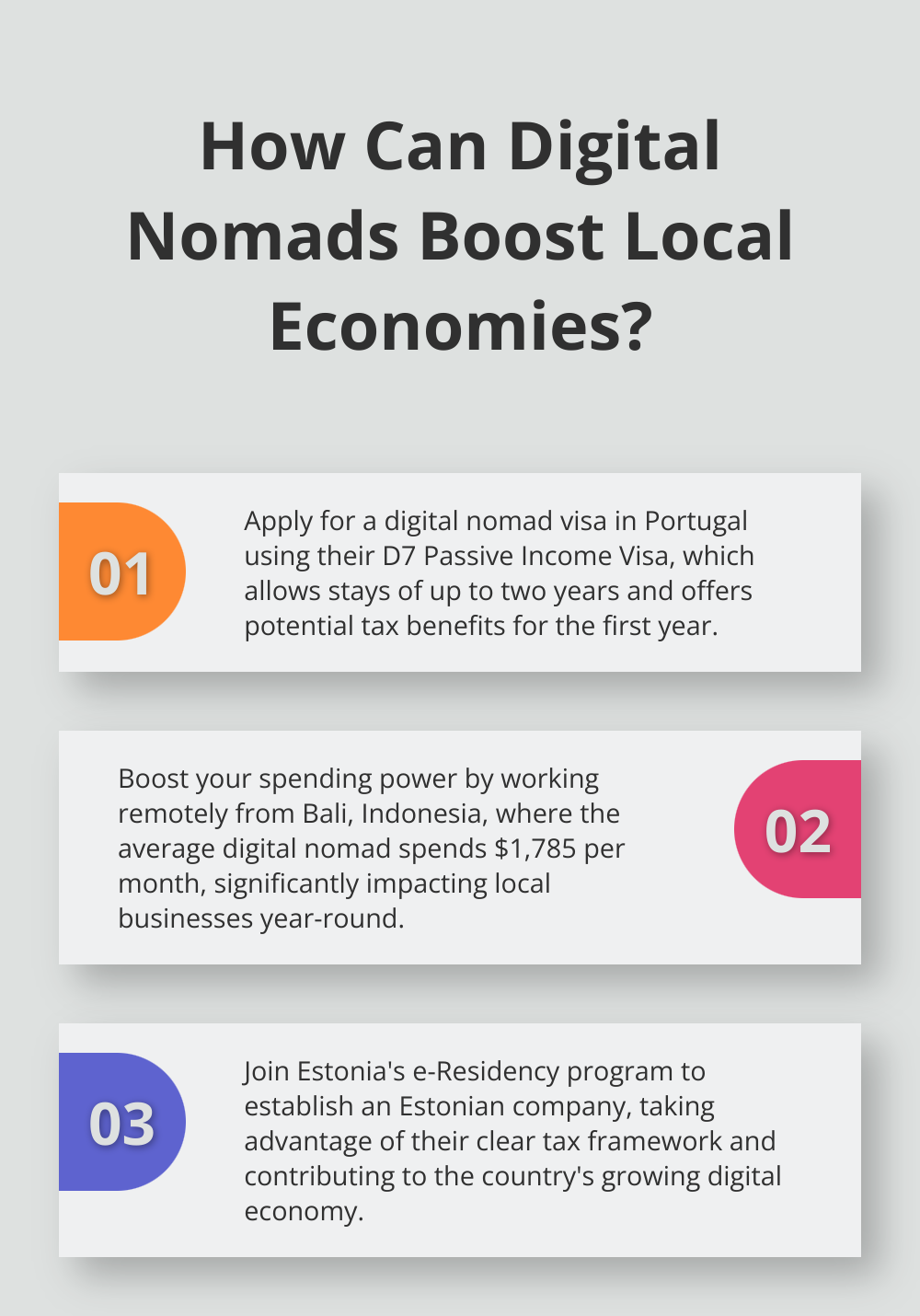Digital Nomad Visas: Boosting Local Economic Growth
Digital nomad visas are reshaping the global workforce landscape. These innovative permits allow remote workers to live and work in foreign countries for extended periods.
At Piter, we’ve seen firsthand how digital nomad visas can boost local economies. From increased tourism to knowledge transfer, these programs offer significant benefits to host countries.
What Are Digital Nomad Visas?
Definition and Purpose
Digital nomad visas are special permits that allow remote workers to legally live and work in a foreign country for longer than a normal tourist visa. These visas cater to the growing trend of location-independent professionals who use technology to perform their jobs from anywhere in the world.
Countries Offering Digital Nomad Visas
As of November 2024, over 50 countries offer digital nomad visas. Portugal leads with its D7 Passive Income Visa, which allows stays of up to two years. Estonia’s e-Residency program (launched in 2014) has attracted e-residents who have established 23,645 Estonian companies, reflecting about a quarter of the total number of individual people. Other popular destinations include Barbados, Croatia, and Thailand, each offering unique benefits to attract remote workers.
Eligibility Criteria
Most digital nomad visas require applicants to prove a stable income from foreign sources. For instance, Dubai’s remote work visa demands a minimum monthly salary of $3,500. Applicants typically need to submit:
- Proof of employment
- Health insurance
- Clean criminal record
Application Process
The application process varies by country. Many nations (like Georgia) offer fast-track options that can approve visas in as little as 10 business days. Processing times differ, but countries compete to streamline their procedures to attract more digital nomads.
Financial Considerations
Understanding the tax implications of these visas is essential. Some countries (like Barbados) offer tax exemptions on foreign income for the first year. Others (such as Portugal) may require you to become a tax resident after a certain period. Consulting with a tax professional familiar with international tax laws before applying for a digital nomad visa is highly recommended.

As digital nomad visas continue to reshape the global workforce landscape, their impact on local economies becomes increasingly significant. In the next section, we’ll explore how these visas boost economic growth in host countries through increased local spending, tourism, and knowledge transfer.
How Digital Nomads Boost Local Economies
Injecting Cash into Local Economies
Digital nomads earn salaries from high-income countries while living in destinations with lower costs of living. This wage disparity translates to increased spending power. A 2023 survey estimates digital nomads contribute $787bn to the global economy annually. This influx of foreign currency stimulates local businesses, from cafes and restaurants to co-working spaces and tour operators.

In Bali, Indonesia, the average digital nomad spends $1,785 per month (according to a survey by Nomad List). This amount significantly exceeds typical tourist expenditure, providing a steady income stream for local businesses year-round, not just during peak tourist seasons.
Revitalizing Real Estate and Hospitality
The influx of digital nomads has sparked a boom in the real estate and hospitality sectors of many host countries. Long-term rentals, once the domain of locals, now attract nomads seeking comfortable living spaces for extended periods.
In Lisbon, Portugal, the real estate market has seen a significant uptick due to digital nomads. The city’s real estate prices increased by 11.9% in 2023 (according to the Portuguese National Statistics Institute). This growth has led to increased investment in property renovations and new developments, creating jobs in construction and related industries.
Fostering Innovation and Skill Transfer
Digital nomads bring more than just their spending power; they bring their skills and expertise. Many host countries leverage this influx of talent to boost their own tech and creative sectors.
Estonia’s e-Residency program exemplifies this trend. During the first half of 2023, companies owned by Estonian e-residents delivered €37,7mil in tax revenue, a 57% increase compared to 2022. These digital nomads have founded over 17,000 companies in Estonia, contributing to the country’s burgeoning reputation as a digital hub.
In Chiang Mai, Thailand, local co-working spaces have become hubs for knowledge exchange. Regular workshops and networking events facilitate skill-sharing between nomads and locals, fostering a culture of innovation and entrepreneurship.
Boosting Tourism and Cultural Exchange
Digital nomads often become unofficial ambassadors for their host countries, sharing their experiences on social media and personal blogs. This organic promotion attracts more visitors and potential long-term residents, further boosting the local economy.
Moreover, the presence of digital nomads encourages the development of cultural exchange programs and language schools. These initiatives not only create jobs but also enrich the local community through diverse perspectives and experiences.
As we explore the economic benefits of digital nomad visas, it’s important to also consider the challenges and considerations that come with implementing these programs. The next section will address the infrastructure requirements, potential impacts on local job markets, and tax implications for both nomads and host countries.
Navigating Challenges of Digital Nomad Programs
Infrastructure Strain
The influx of digital nomads can stress local infrastructure, especially in smaller cities or developing countries. Bali, Indonesia experienced traffic congestion and water shortages in popular areas like Canggu due to the rapid increase in remote workers. Local governments must upgrade internet connectivity, transportation, and utilities to meet the growing demand.

Madeira, Portugal launched a Digital Nomad Village project. They invested in high-speed internet infrastructure and co-working spaces to attract remote workers. This proactive approach helped the island manage the influx of digital nomads while benefiting local businesses.
Housing Market Disruption
The arrival of digital nomads with higher spending power can increase rental prices, potentially pricing out local residents. In Mexico City, home prices are rising due to rapid population growth, declining interest rates, and lack of supply.
Some cities implement regulations to address this issue. Barcelona, Spain has limited short-term rentals and introduced affordable housing initiatives to protect local residents from displacement.
Tax Complexities
Tax implications for digital nomads and host countries can become complex. While some countries offer tax exemptions to attract nomads, others struggle with how to tax this mobile workforce.
Estonia’s e-Residency program provides a clear framework for taxation, requiring e-residents to pay taxes on income earned through their Estonian companies. This approach ensures that digital nomads contribute to the local economy while providing them with a straightforward tax structure.
However, not all countries have such clear policies. Digital nomads must navigate international tax treaties and local tax laws to ensure compliance. Host countries need to develop clear tax guidelines for nomads to prevent potential revenue loss and ensure fair contribution to local services.
Local Job Market Impact
While digital nomads can bring valuable skills and knowledge, they risk creating a two-tiered job market. In some cases, local businesses may prefer hiring nomads for their international experience, potentially disadvantaging local workers.
To mitigate this, countries like Portugal require companies to maintain a certain ratio of local to foreign employees. Additionally, programs that facilitate skill-sharing between nomads and locals can help bridge any gaps and create more opportunities for the local workforce.
Final Thoughts
Digital nomad visas have emerged as powerful tools for boosting local economies. These programs attract skilled professionals who inject foreign currency into host countries, stimulating growth across various sectors. The economic advantages are substantial, from revitalizing real estate markets to fostering innovation through knowledge transfer.

The future outlook for digital nomad visas and global workforce mobility is promising. More countries will likely introduce or refine their visa programs to attract this lucrative demographic. We expect to see increased competition among nations to offer the most attractive packages for digital nomads.
At Piter, we understand the importance of flexibility and security in the digital age. For those interested in exploring the world of crypto gambling, Wolfbet offers a secure and exciting platform with generous bonuses and instant withdrawals. How digital nomad visas can boost local economies will remain a key focus for policymakers and economists worldwide.



